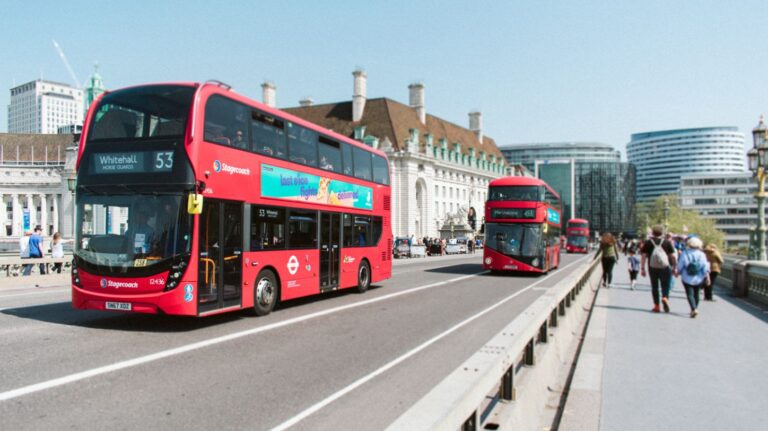Transport for London (TfL) has published its Bus Safety Strategy, outlining steps toward achieving the mayor’s Vision Zero goal by 2041.
The initiative aims to eliminate all deaths and serious injuries on the transport network, with a particular focus on London’s extensive bus network.
The Bus Safety Strategy follows TfL’s Bus Safety Programme, which was established in 2016 and has reportedly gone on to achieve the greatest reduction in the number of people killed or seriously injured per journey compared to any other road-based mode of transport.
According to TfL, in 2022 there was a 65% reduction in fatalities involving London buses, compared to the operator’s 2005-09 baseline. Additionally, the number of people seriously injured has reportedly decreased by 54%, compared to a 38 % reduction across all transport modes on London’s roads
Central to the programme is the Bus Safety Standard, which sets stringent safety requirements for new buses in London’s fleet. Today, more than 1,000 buses in TfL’s fleet now meet this standard.
The roadmap for the Bus Safety Standard has introduced several safety measures, including the implementation of intelligent speed assistance technology to ensure buses adhere to speed limits; responsive acoustic vehicle alerting systems that signal the presence of zero-emission vehicles, and urban bus sounds to alert pedestrians and cyclists to quiet-running buses.
Upcoming improvements in 2024 include advanced emergency braking, enhancements to passenger safety within bus interiors and vulnerable road user alerting systems.
Louise Cheeseman, TfL’s director of buses, said: “Safety is our first consideration in all that we do to deliver bus services in London and we’re determined that it will continue to be at the heart of our transport network.
“This new strategy is a vital part of our approach to systematically making transport safer for everyone. The measures outlined in this strategy will be vital to achieving our Vision Zero goal of ensuring nobody is killed or seriously injured on the transport network.”
Recently, TfL launched its fourth Bus Safety Innovation Challenge, seeking solutions to reduce injuries to passengers, especially incidents occurring while standing, moving, or using stairs on buses.
Key commitments within the strategy include retrofitting safety technology onto existing buses, with plans to equip 1,800 additional buses with intelligent speed assistance by 2024, and the majority of the fleet by 2030.
What’s more, TfL will commission research to identify effective measures to prevent and mitigate risks associated with pedal application errors, trial fatigue detection technologies on up to 450 buses, and implement a data-led approach to reduce passenger injuries caused by slips, trips and falls.
Collaboration with the London Fire Brigade and other stakeholders is a priority to address the risks posed by bus fires. The strategy also emphasises the importance of inclusivity, ensuring that safety improvements benefit everyone working in or using the bus network.
However, TfL emphasised that all existing and future achievements require continued collaboration to further improve bus safety and reduce harm to all road users.
Innovations and achievements in road safety will be highlighted and celebrated at the second annual CiTTi Awards on 21 November 2023 at the De Vere Grand Connaught Rooms in London. Visit www.cittiawards.co.uk to learn more about this unmissable event for the UK’s transportation sector – and to book your table today!





